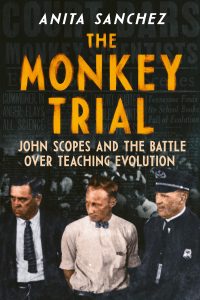 A Junior Library Guild Gold Standard Selection
A Junior Library Guild Gold Standard Selection
Arrested? For teaching? John Scopes’s crime riveted the world, and crowds flocked to the trial of the man who dared to tell students about a forbidden topic—evolution.
The year was 1925, and discussing Darwin’s theory of evolution was illegal in Tennessee classrooms. Lawyers wanted to challenge the law, and businessmen smelled opportunity. But no one imagined the firestorm the Scopes Trial would ignite—or the media circus that would follow.
As reporters, souvenir-hawking vendors, angry protestors, and even real monkeys mobbed the courthouse, a breathless public followed the action live on national radio broadcasts. All were fascinated by the bitter duel between science and religion, an argument that boiled down to the question of who controls what students can learn—an issue that resonates to this day.
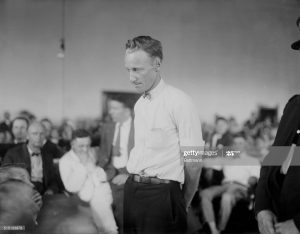
John T. Scopes as he stood before the judges stand and was sentenced.
Revealing little-known facts about the fight to teach evolution in schools, this riveting account of the dramatic 1925 Scopes Trial (aka “the Monkey Trial”) speaks directly to today’s fights over what students learn, the tension between science and religion, the influence of the media on public debate, and the power of one individual to change history. With contemporary visuals and evocative prose, Anita Sanchez vividly captures the passion, personalities, and pageantry of the infamous “Monkey Trial,” highlighting the quiet dignity of the teacher who stood up for his students’ right to learn.
The Reviews are In!!
KIRKUS [STARRED REVIEW!]
With cogence aplenty for current national issues, a look at “monkeyshines” in an infamous 1925 Tennessee trial.
Sanchez expertly sifts a mountain of documentary evidence to present a coherent account of the event…and to evenhandedly portray the profound clash of values it exposed. She carefully analyzes the characters of John Scopes, a naïve but intelligent and ultimately disaffected substitute teacher, and charismatic populist William Jennings Bryan, among other figures…Along with a generous array of contemporary photos, she also inserts substantial extracts from the high school biology textbook Scopes used—which, it turns out, promoted racist eugenics as well as evolutionary theory—and from the book of Genesis as well as scorching commentary from observers like H.L. Mencken and W.E.B. Du Bois. And if readers aren’t drawn in by the compelling views of courtroom battles and strategy, they will be absorbed by the issues of scientific versus religious truth, of rights to free speech, and divisive regionalism that motivated all the ruckus, being as contentious today as ever. As the author, mulling the question of “Who won the Monkey Trial?” concludes: “The jury is still out.”
Perceptive, well written and reasoned, and (unfortunately) at least as topical as ever. (author’s note, glossary, timeline, source notes, bibliography, annotated resources for young readers, photo credits) (Nonfiction. 11-14)
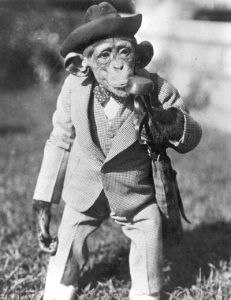 Publishers Weekly [STARRED REVIEW!]
Publishers Weekly [STARRED REVIEW!]
Sanchez brings a sense of immediacy to a 1925 watershed event that still echoes in American politics and discourse…Through photographs and conversational prose, Sanchez shows how sleepy Dayton became a “circus,” experiencing throngs of visitors, chimpanzees promoting local businesses, and crowds eager for the main event: a highly publicized courtroom face-off between defense lawyer Clarence Darrow and prosecuting lawyer William Jennings Bryan, both previously regarded as men of the people. “Media in the Spotlight” sections contextualize the role of newspapers, newsreels, and radio in spreading information. It’s a lively, solidly researched tale that delivers enduring truths about the lure of controversy.
From the Book:
Introduction: Call Howard Morgan To the Stand
Fourteen-year-old Howard Morgan wasn’t used to wearing a tie. That morning, he had struggled in front of the bathroom mirror to get the thin strand knotted properly under his stiff collar. Now, as he walked to the front of the courtroom, the tie had slewed around until it was almost under one ear. Too late to fix it. The Rhea County Courthouse was jammed with more than a thousand spectators—standing room only—and every eye was aimed at him.
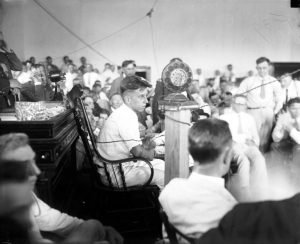 Everyone in the courthouse was dripping with sweat, since the July afternoon was hot and humid, and the temperature in the building was well over ninety degrees. Howard took his seat on the ornately carved chair high on a platform, and clutched the armrests.
Everyone in the courthouse was dripping with sweat, since the July afternoon was hot and humid, and the temperature in the building was well over ninety degrees. Howard took his seat on the ornately carved chair high on a platform, and clutched the armrests.
The judge and a dozen lawyers clustered at the front of the packed courtroom. Most of the lawyers were strangers to Howard, but he recognized William Jennings Bryan—after all, he was one of the most famous men in America. Howard had seen his picture often enough in the papers, since Bryan had run for President three times. Mr. Bryan was waving a palm-leaf fan in front of his face, which was red with heat. Howard also recognized the defense lawyer, Clarence Darrow, who had been in town for several days, often chatting with the folks who lived in the small town of Dayton, Tennessee. Mr. Darrow, like most of the lawyers, had removed his jacket because of the sweltering temperature, and grinned as he flaunted bright purple suspenders. And Mr. Scopes, one of Howard’s favorite teachers at the high school, was there in the front of the room, sitting at a long table and calmly watching from behind big round spectacles.
Telephone and telegraph wires snaked through the courthouse, winding along the floor and dangling from the rafters. A bank of shiny microphones was just inches away from Howard’s seat on the witness platform. Radio announcers and reporters were waiting eagerly to hear what he had to say. Howard waited on the hard wooden seat as Mr. Stewart, the prosecutor, approached.
The first questions were easy, and Howard answered in a clear, high-pitched voice. Your name is Howard Morgan?
Yes, sir.
You are Mr. Luke Morgan’s son?
Yes, sir.
Your father works in the bank here, Dayton Bank and Trust company?
Yes, sir.
Then the prosecutor held up a scuffed, green-covered book Howard recognized: Hunter’s Civic Biology.
Were you studying this book in April of this year, Howard?
Yes, sir.
Did Mr. Scopes teach it to you?
Howard replied in almost a whisper. Yes, sir.
Then came the all-important question, the one Howard was waiting for. State what Mr. Scopes taught you.
Howard knew the answer to this question, too, almost as well as he knew his own name. He had rehearsed it often enough. Mr. Scopes himself had coached him thoroughly, preparing him for this cross-examination as though it was just another biology test.
Howard took a deep breath and spoke out clearly. “He said that the earth was once a hot molten mass too hot for plant or animal life to exist upon it; in the sea the earth cooled off; there was a little germ of one cell organism formed, and this organism kept evolving until it got to be a pretty good-sized animal, and then came on to be a land animal and it kept on evolving, and from this was man.”
The prosecutor gave a satisfied nod, and the defense lawyers looked grim. Howard’s testimony removed all doubt—he had been an eye-witness. His teacher was guilty as charged. Mr. Scopes had indeed broken the law against teaching Darwin’s theory of evolution in the classroom of a Tennessee public high school.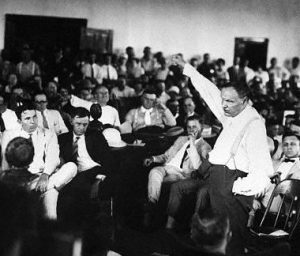





Recent Comments